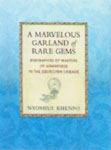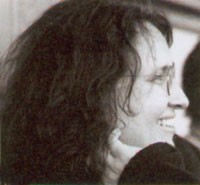Perfect Love, Imperfect Relationships: Healing the Wound of the Heart
John Welwood Boston: Trumpeter, 2006 224 pp.; $19.95 (cloth)
 Love is always there, waiting for you. You just need to learn how to let it in. That’s the overriding message in psychotherapist and best-selling author John Welwood’s latest guide to better living, and Welwood is going to teach us how to let it in. The problem, according to Welwood, is that we are all suffering from a deep “wound of the heart, ” a belief born out of imperfect human relationships that we are not lovable as we are. With clear instructions and an even tone, Welwood shows us how to heal our psychic scars by opening up to the “great love” available to us all at the core of our nature.
Love is always there, waiting for you. You just need to learn how to let it in. That’s the overriding message in psychotherapist and best-selling author John Welwood’s latest guide to better living, and Welwood is going to teach us how to let it in. The problem, according to Welwood, is that we are all suffering from a deep “wound of the heart, ” a belief born out of imperfect human relationships that we are not lovable as we are. With clear instructions and an even tone, Welwood shows us how to heal our psychic scars by opening up to the “great love” available to us all at the core of our nature.
A Marvelous Garland of Rare Gems: Biographies of masters of awareness in the Dzogchen lineage
Nyoshul Khenpo; Richard Barron, trans. Junction City: Padma Publishing, 2005 736 pp.; $49.00 (cloth)

Concern among some Tibetan Buddhist lineages that their histories are in danger of being lost is understandable. For the Nyingtik lineage, central to the Dzogchen approach, such worries have been laid to rest with this monumental chronicle. Nyoshul Khenpo (1931–1999), himself a beloved Dzogchen master, strings together this “marvelous garland” with a series of biographical accounts of the many past and present vidyadhara masters, or “holders of awareness,” and their disciples. This history of an unbroken line of transmission will no doubt inspire confidence in future generations and will be a resource for scholars and practitioners alike.
The True Dharma Eye: Dogen’s 300 Koans
John Daido Loori; Kazuaki Tanahashi, trans. Boston: Shambhala Publications, 2005 528 pp.; $39.95 (cloth)
 Zen Master Eihei Dogen, thirteenth-century founder of the Japanese Soto school of Zen, was at times critical of koan study. This collection of three hundred koans, compiled by Dogen himself, is ample proof that he did consider them a useful tool for Zen practice. Though far less well known than his masterwork the Kana Shobogenzo, these koans inform much of Dogen’s other work. Loori Roshi, abbot of Zen Mountain Monastery, in Mt. Tremper, New York, and an accomplished teacher and author in his own right, has added his own commentaries and poetic cap verses, offering to modern students new entry into this profound and ancient practice.
Zen Master Eihei Dogen, thirteenth-century founder of the Japanese Soto school of Zen, was at times critical of koan study. This collection of three hundred koans, compiled by Dogen himself, is ample proof that he did consider them a useful tool for Zen practice. Though far less well known than his masterwork the Kana Shobogenzo, these koans inform much of Dogen’s other work. Loori Roshi, abbot of Zen Mountain Monastery, in Mt. Tremper, New York, and an accomplished teacher and author in his own right, has added his own commentaries and poetic cap verses, offering to modern students new entry into this profound and ancient practice.

What They’re Reading: Sharon Salzberg
I am reading Jonathan Cott’s book On the Sea of Memory: A Journey from Forgetting to Remembering, an expansive and exciting investigation of memory and its role in forming our sense of self. Cott, a successful journalist and author, is a friend of mine. Several years ago I witnessed his struggle to recover from a deep depression. I have also seen the terrible effect ECT treatments [electroshock therapy] have had on his memory, and know Cott’s uncertainty about whether that memory loss might affect his ability to write.
I am finding On the Sea of Memory a sensitive and insightful work, as Cott powerfully recounts his own experience and, in a series of interviews, crafts and exploration of Alzheimer’s, the drive to forget traumatic incidents, the neurobiology of memory, the spiritual significance of memory in Judaism, Sufism, and Buddhism [a dialogue with Sogyal Rinpoche about remembering past lives], the role of memory in the African tradition of storytelling, and the way emotional memory is used in the Stanislavsky method of acting [as recounted in a conversation with Ellen Burstyn]. It is a beautifully written book about loss, and also about the ways we are enriched by connection. Ultimately I see it as being about truly knowing who we are.
Thank you for subscribing to Tricycle! As a nonprofit, we depend on readers like you to keep Buddhist teachings and practices widely available.